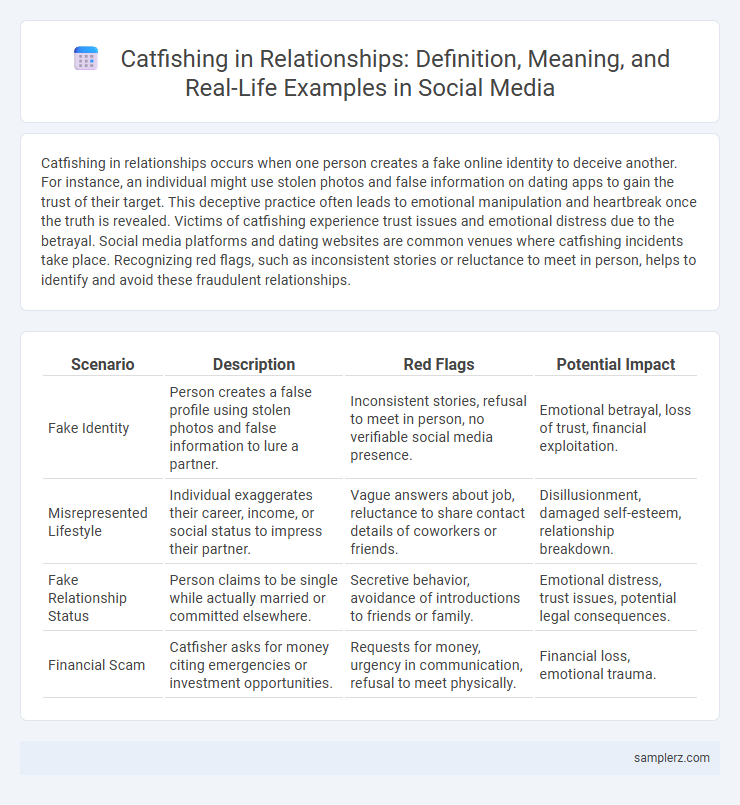Catfishing in relationships occurs when one person creates a fake online identity to deceive another. For instance, an individual might use stolen photos and false information on dating apps to gain the trust of their target. This deceptive practice often leads to emotional manipulation and heartbreak once the truth is revealed. Victims of catfishing experience trust issues and emotional distress due to the betrayal. Social media platforms and dating websites are common venues where catfishing incidents take place. Recognizing red flags, such as inconsistent stories or reluctance to meet in person, helps to identify and avoid these fraudulent relationships.
Table of Comparison
| Scenario | Description | Red Flags | Potential Impact |
|---|---|---|---|
| Fake Identity | Person creates a false profile using stolen photos and false information to lure a partner. | Inconsistent stories, refusal to meet in person, no verifiable social media presence. | Emotional betrayal, loss of trust, financial exploitation. |
| Misrepresented Lifestyle | Individual exaggerates their career, income, or social status to impress their partner. | Vague answers about job, reluctance to share contact details of coworkers or friends. | Disillusionment, damaged self-esteem, relationship breakdown. |
| Fake Relationship Status | Person claims to be single while actually married or committed elsewhere. | Secretive behavior, avoidance of introductions to friends or family. | Emotional distress, trust issues, potential legal consequences. |
| Financial Scam | Catfisher asks for money citing emergencies or investment opportunities. | Requests for money, urgency in communication, refusal to meet physically. | Financial loss, emotional trauma. |
Real-Life Catfishing Stories in Modern Relationships
Real-life catfishing stories in modern relationships reveal how individuals create fake online personas to deceive partners, often leading to emotional trauma and broken trust. One notable example involves a woman discovering her boyfriend's entire online profile was fabricated by a scammer using stolen photos and false credentials. These incidents highlight the need for verifying identities in digital dating to safeguard emotional well-being and maintain genuine connections.
Signs of Catfishing: Case Studies and Examples
Common signs of catfishing in relationships include inconsistent personal information, reluctance to meet in person, and overly perfect online profiles. For instance, the case of "Emily" revealed discrepancies in photos and vague answers during video calls, highlighting deception. Another example involves "David," who discovered his partner was using fake social media accounts and avoided sharing personal details, confirming fraudulent intent.
How Catfish Use Fake Identities in Online Romance
Catfish manipulate online romance by creating fake identities to exploit emotional vulnerabilities and build trust over time. They use stolen photos and fabricated personal stories to appear genuine, often targeting individuals seeking meaningful relationships. This deceptive behavior undermines authentic connections, causing significant emotional distress for those involved.
Famous Relationship Catfishing Scandals
Famous relationship catfishing scandals include the 2019 case of Manti Te'o, a Notre Dame football star who was deceived by a fake online girlfriend, impacting his public image and trust. Another notable example is the story of a woman known as 'Jody', who manipulated several men by creating false identities across social media platforms, leading to widespread media coverage. These incidents highlight the emotional and reputational damages caused by digital deception in modern relationships.
Social Platforms Most Common for Catfishing
Social platforms such as Facebook, Instagram, and Tinder are the most common venues for catfishing in relationships due to their vast user base and ease of creating fake profiles. Users often exploit these platforms' interactive features and anonymity to fabricate identities and manipulate emotional connections. Understanding the prevalence of catfishing on these social sites helps in recognizing warning signs and protecting personal information.
Catfishing Tactics: Manipulation in Digital Dating
Catfishing tactics in digital dating often involve creating fake profiles and using emotional manipulation to gain trust and exploit victims. Perpetrators may fabricate personal stories, mimic communication styles, and isolate targets from their social circles to maintain control. These deceptive behaviors undermine genuine connections and pose significant risks to emotional well-being and online safety.
Emotional and Psychological Impact of Catfishing Victims
Catfishing in relationships often causes severe emotional distress, including anxiety, depression, and trust issues that may persist long after the deception is uncovered. Victims frequently experience feelings of betrayal and lowered self-esteem, which can hinder their ability to form future relationships. The psychological impact extends to social isolation and difficulties in distinguishing genuine connections, amplifying the trauma induced by the fabricated identity.
How Victims Discovered Catfishing in Their Relationships
Victims of catfishing in relationships often discover the deception through inconsistencies in stories or suspicious online behavior, such as untraceable photos or reluctance to meet in person. Social media reverse image searches and unexpected friend requests from mutual connections frequently reveal discrepancies. Emotional red flags include avoidance of video calls and delayed or vague responses, prompting victims to investigate further.
Legal Consequences of Catfishing in Relationships
Catfishing in relationships, involving deceptive online identities, can lead to serious legal consequences including charges of fraud, harassment, and identity theft. Victims may pursue civil lawsuits for emotional distress and damages caused by the perpetrator's false representations. Law enforcement agencies increasingly prosecute catfishing cases under cybercrime statutes, emphasizing the importance of digital identity verification to protect relationship integrity.
Preventing Catfishing: Lessons Learned from Real Cases
Real cases of catfishing in relationships reveal the importance of verifying online identities through video calls and social media cross-checks to prevent emotional deception. Insights from these incidents highlight recognizing inconsistent personal details and avoiding sharing sensitive information prematurely. Adopting these measures can significantly reduce the risk of falling victim to catfishing scams.

example of catfishing in relationship Infographic
 samplerz.com
samplerz.com